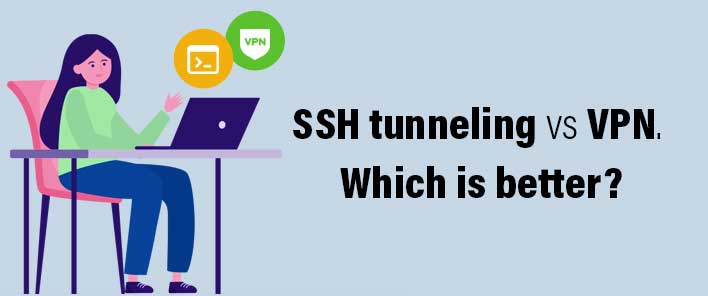In today’s era, everything you do on the internet can be tracked and recorded for multiple reasons. Many claim that this process of data collection and further distribution is an effective way to curate content and personalize advertisements. However, it is a concern for users who want to keep their activity on the Internet secure from prying eyes. There are several ways to protect your data and make it secure. In this blog we will be discussing and comparing two of the prominent methods for secure net browsing: SSH (Secure Shell) Tunnel & VPN (Virtual Private Network)
What is SSH Tunnel?
The full form of SSH is a secure shell. A shell is like software that allows you to communicate with your device’s operating system using a command line. It is not necessary to install the shell on your device. Instead, it can be accessed via a shell account. Users can log in through any device and access the internet for emails, stored data files, and much more in a secure manner. Shell accounts use public-key encryption to browse web pages with enhanced security.
In addition to making available a secure, remote terminal environment, Shell can be used to tunnel traffic, mount remote file systems, and transfer files. Given its highly secure encryption features, you can also turn your Shell client into a SOCKS(socket secure) proxy. This basically refers to gaining access to sensitive information and data only by authorized personnel. SSH tunneling is an alternative to using a VPN to access restricted websites blocked by region or network and browse the internet while keeping your identity hidden.
What is VPN?
Commonly referred to as a VPN, a Virtual Private Network is a cost effective and more feasible alternative to physical private networks such as LAN or WAN. It can be difficult for big companies with offices located over several cities or countries to set up a secure physical private network. Therefore, resorting to a private network that’s hosted virtually comes to the rescue.
The use of a VPN enables employees of a company to access the web and other private data resources through a remote computer securely. The data accessed from the remote device is encrypted to the company’s network, making it safe from security breaches and unwanted access. General users of the internet can also use a VPN to hide their IP address and other crucial details from the websites they browse. A VPN can help safeguard users from identity theft and invasion of privacy. Additionally, it can allow users to access content that is unavailable to them due to geographical barriers.
SSH vs VPN
The primary difference between SSH and VPN is that while the former connects to a specific computer, the latter connects with a private network. A comparison of both these technologies is drawn out below based on some important features.
- User-Friendliness
SSH is more inclined towards command lines. While this has its obvious advantage of prohibiting non technical people to access information, it can also get a little confusing for everyday users.
Compared to SSH, a VPN is more user friendly. Since it is basically a virtual alternative of a local network, employees (specially non-technical) feel more comfortable with it. Additionally, users do not need a command line to communicate with other websites, making it easier for people to use a VPN.
- Privacy & Security
Both SSH and VPN add an enhanced layer of security for its users. The effectiveness of them depends on the use. If someone is looking to browse the internet securely from public Wi-Fi networks, either of the two technologies will serve the need. However, for a Business setup, a VPN is certainly more secure as it allows you to force all network traffic on the system.
Conclusively, both technologies provide secure and reliable solutions to the threat of data breaches and invasion of privacy. A VPN is a more secure alternative for businesses. However, the level of security depends on the service provider.

